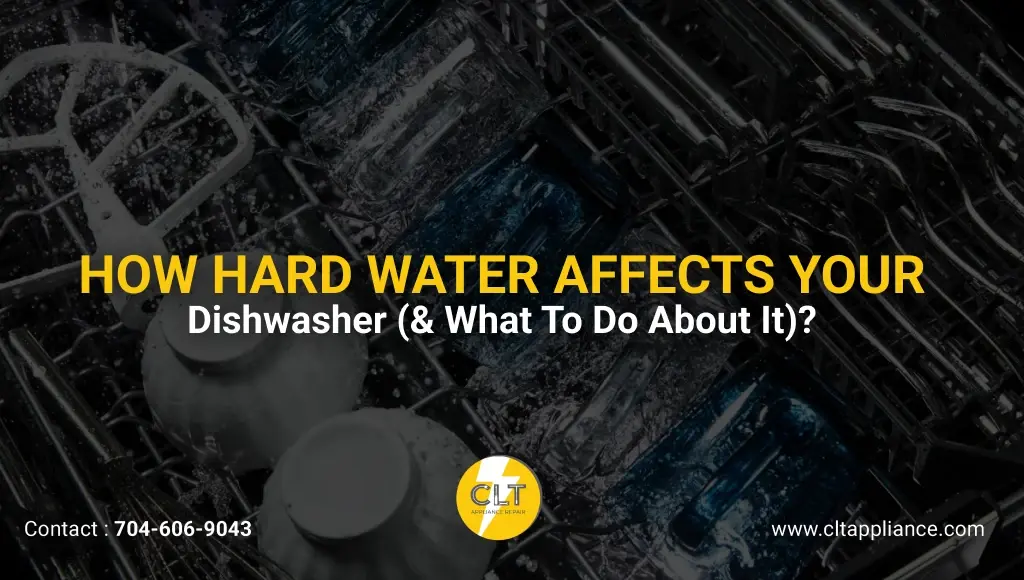Spotty dishes, white residue on glassware, and poor cleaning performance might not be your dishwasher’s fault, your water could be the culprit. Millions of American households deal with mineral-rich water daily. These minerals, while safe to drink, can damage appliances that use water regularly.
Your dishwasher is particularly vulnerable as it cycles large amounts of water through numerous components. When it underperforms, you waste water and energy while shortening the appliance’s lifespan. Water pressure is equally important, inadequate pressure prevents proper cleaning regardless of water quality.
Spoiler Alert: Hard Water Ruins Dishwasher Components
Does hard water affect dishwasher performance? Absolutely! Hard water contains high concentrations of calcium and magnesium minerals, which calcify inside your machine, leaving white residue on interior components and triggering several issues.
Understanding water hardness levels is crucial. Water with more than 7 grains per gallon (gpg) or 120 parts per million (ppm) is considered “hard,” while levels above 10.5 gpg are “very hard.” Testing kits available at home improvement stores can determine your specific water hardness level, which directly correlates with how quickly mineral deposits form in your dishwasher.
Scaling on Essential Parts
Scale accumulates on spray arms and heating elements when using hard water. Clogged spray arm holes create irregular water patterns, leaving some dishes dirty. Mineral deposits on heating elements form an insulating layer that reduces heating efficiency, increasing energy consumption and shortening component lifespan.
This mineral buildup process accelerates exponentially with higher water hardness levels. For context, a dishwasher operating with water rated at 15 gpg can develop significant spray arm blockages within just 6-8 months of regular use, compared to minimal buildup after years of use with soft water (under 3 gpg).
Diminished Cleaning Results
How does hard water affect dishwasher cleaning capabilities? In several ways:
- Minerals bind with detergent, reducing cleaning power
- Dishes develop spots and cloudy appearances
- A thin film covers dishes despite full wash cycles
A standard dishwasher typically lasts ten years, but hard water can significantly reduce this timeframe. Statistics show hard water increases energy costs for water heaters (up to 29%) and washing machines (up to 24%). The same principle applies to dishwashers. When deposits coat components and restrict water flow, your dishwasher works harder, consuming more electricity and deteriorating faster.
Water Pressure Factors Affecting Cleaning Performance
Water pressure represents another crucial factor for proper dishwasher function. While not exactly water hardness, these issues often compound each other. Can low water pressure affect dishwasher efficiency? The answer is a definite YES, with several noticeable consequences.
-
Insufficient Pressure Impact on Cleaning
When water pressure falls too low, several problems emerge:
- Cleaning efficiency decreases as water cannot be properly distributed throughout the dishwasher cavity
- Cycle times extend because the machine takes longer to fill
- Food particles remain stuck to dishes, requiring additional cycles or manual rinsing
Does water pressure affect dishwasher filling capacity? Yes to that too, unfortunatley. Insufficient pressure prevents proper drum filling, leaving the machine unable to operate within design parameters.
-
Optimal Pressure Requirements
For best dishwasher performance, water pressure should range between 20-120 PSI. Pressure below 20 PSI can cause water supply valve failures, preventing proper closure. Most household dishwashers work optimally with pressure around 50-60 PSI.
You can easily test your home’s water pressure using an inexpensive pressure gauge from any hardware store. Simply attach it to an outside spigot or utility sink and open the valve fully. If readings consistently fall below 40 PSI, this likely explains poor dishwasher performance regardless of water hardness. Distinctive symptoms of pressure issues (rather than hard water problems) include unusually long fill times, cycles that seem to pause or restart, and the dishwasher failing to drain completely.
If you notice extended cycle times, poor cleaning results despite using quality detergent, or incomplete water drainage, your home might have water pressure issues affecting how your dishwasher operates.
Temperature Considerations For The Best Kind Of Cleaning
Most modern dishwashers connect to your home’s hot water supply and contain internal heating elements to further increase the temperature during wash cycles. This combination ensures effective cleaning performance. Does running the dishwasher affect hot water availability elsewhere in your home? It can, especially in homes with smaller water heaters or when multiple hot water appliances operate simultaneously.
Proper Water Temperature Requirements
Ideally, water should enter your dishwasher at approximately 120°F. The internal heating element then increases this temperature to over 155°F for the most effective cleaning. Hot water proves essential because it:
- Activates detergent compounds more efficiently
- Breaks down food residue and grease more effectively
- Facilitates spot-free drying of dishes and glassware
Hard water significantly impacts heating element efficiency over time. As scale builds up on heating elements (appearing as white, chalky deposits), it creates an insulating barrier that forces elements to work harder and longer to achieve proper temperatures. A heavily scaled heating element can take up to 30% longer to heat water and consume up to 25% more electricity in the process. This not only increases energy costs but also dramatically shortens the heating element’s lifespan through overheating and metal fatigue.
Using cold water forces your dishwasher to work harder, extending cycle times and increasing energy consumption as the heating element compensates for the temperature difference.
Water Consumption Considerations
Standard ENERGY STAR-certified dishwashers use between 3-5 gallons of hot water per typical cycle. Some intensive cycles may require up to 9 gallons, while compact ENERGY STAR models average around 2.7 gallons per cycle.
This water usage directly impacts your hot water system. In homes with smaller water heaters, running a dishwasher can temporarily deplete available hot water for showers or other appliances. Planning dishwasher usage around peak hot water needs helps avoid temperature fluctuations in other household activities.
Practical Methods To Combat Mineral Buildup
Once you recognize hard water damage in your dishwasher, several effective solutions can address these issues. These range from simple maintenance to more comprehensive home water treatment options.
-
Regular Cleaning Practices
Using dishwasher cleaners specifically formulated to remove mineral deposits every 1-3 months provides the most effective first line of defense. These products are designed to dissolve limescale without damaging internal components and typically require running an empty cycle with the cleaner placed in the detergent compartment.
Additional maintenance practices to minimize mineral buildup include:
- Running vinegar rinses by adding two cups of white vinegar to the bottom of your empty dishwasher
- Cleaning spray arms monthly by removing them and clearing any clogged holes with a thin wire
Step-by-step vinegar cleaning process:
- Remove all dishes and racks if possible
- Place a dishwasher-safe cup filled with white vinegar on the top rack
- Run a hot water cycle without detergent
- After completion, sprinkle 1 cup of baking soda across the bottom
- Run a short hot water cycle
- For spray arm maintenance, remove them according to your manual’s instructions, use a toothpick or thin wire to clear visible holes, then soak in vinegar for 30 minutes before reinstalling
-
Water Treatment Solutions
Installing a whole-house water softener system offers the most comprehensive approach to hard water issues. These systems remove calcium and magnesium minerals before water enters any of your appliances, protecting your entire home from scale buildup. While requiring initial investment, softeners typically pay for themselves through extended appliance lifespans and reduced detergent usage.
Other options for addressing hard water problems include:
- Using water conditioners that alter mineral structures without removing them
- Adding high-quality rinse aids to each dishwasher cycle to prevent spots and films
-
Detergents
Choose dishwasher detergents specifically formulated for hard water areas. These contain additional ingredients that counteract mineral effects. Many premium detergents now include built-in water softeners that help mitigate moderate hard water problems.
When selecting detergents for hard water conditions:
- Look specifically for products labeled “for hard water”.
- Choose powder or tablet formulations over gels, as they typically contain more effective water softening agents
- For water testing above 10 gpg hardness, increase detergent dosage by 25-30% above manufacturer recommendations
- Consider adding a separate water softening booster (like Lemi Shine) alongside your regular detergent for extremely hard water
Water Pressure and Maintenance Tips
Alongside hard water issues, addressing water pressure problems will significantly improve dishwasher performance. Combined with regular maintenance, these solutions help extend your appliance’s lifespan and maintain cleaning efficiency.
Fixing Low Water Pressure Problems
Testing water pressure using a pressure gauge at outside spigots or utility sinks provides valuable diagnostic information. Most hardware stores sell inexpensive gauges that attach to outdoor faucets. Ideally, your reading should fall between 45-80 PSI for optimal household appliance performance. Consistently low readings indicate a systemic issue that may require professional attention.
Other solutions for water pressure issues include:
- Inspecting supply hoses for kinks or bends that restrict water flow
- Cleaning the inlet filters where the water line connects to your dishwasher
- Running hot water at the nearby kitchen sink before starting dishwasher cycles
- Installing a water pressure booster if pressure consistently measures below 30 PSI
Effective Maintenance Practices
Cleaning food trap filters after every 5-10 cycles prevents clogs that impact water circulation and drainage. These filters typically sit at the bottom of your dishwasher and collect food particles. Regular cleaning prevents odors and ensures proper water flow throughout the machine. Simply remove the filter according to the manufacturer’s instructions, rinse under warm water, and reinstall.
Additional maintenance steps to implement regardless of water quality:
- Inspect and clean door seals monthly to prevent leaks and maintain proper pressure
- Check spray arms quarterly for free movement and clear spray holes
- Run empty hot water cycles with dishwasher cleaner monthly
- Arrange professional maintenance annually for thorough inspection and cleaning
Ending Notes
Addressing hard water and water pressure issues offers significant long-term benefits for your dishwasher and other household appliances. Taking proactive steps now can prevent costly repairs and replacements while ensuring consistently clean dishes.
CLT Appliance Repair offers comprehensive dishwasher diagnostics that include water quality and pressure testing to identify the root causes of poor performance. Our services help Charlotte residents protect their appliances from hard water damage while maximizing cleaning efficiency and extending dishwasher lifespan.
Frequently Asked Questions
How often should I clean my dishwasher if I have hard water?
With hard water, clean your dishwasher monthly using a commercial dishwasher cleaner or a vinegar solution. Also, descale spray arms quarterly and check filters every 2-3 weeks for mineral buildup. Areas with extremely hard water may require more frequent cleaning.
Can hard water damage dishwasher seals and gaskets?
Yes, mineral deposits from hard water can deteriorate rubber seals and gaskets over time. These deposits cause seals to become brittle, leading to leaks and poor water pressure. Regular cleaning with vinegar or citric acid solutions helps protect these components.
How can I tell if my dishwasher problems are from hard water or mechanical issues?
Hard water typically causes white residue on dishes and interior surfaces, spotty glassware, and gradually declining performance. Mechanical issues usually appear suddenly with noises, error codes, or complete failure of specific functions. Test water hardness with an inexpensive kit to confirm.
Author

- John Bennett
- John Bennett is a seasoned appliance repair specialist at CLT Appliance Repair, where he brings over a decade of technical expertise and a strong commitment to customer satisfaction. With a background in electrical and mechanical systems, John has built a reputation for reliable, efficient, and honest repair services across a wide range of household appliances-including refrigerators, washing machines, ovens, and more.
Latest entries
News12/28/2025Fix or Replace? A Guide to Charlotte Appliance Decisions
News12/25/2025Why Same-Day Service Matters: CLT Appliance Repair’s Rapid Response Promise
News12/22/2025Appliance Repair in Charlotte, NC: What to Expect During a Service Visit
News12/20/2025Fast & Reliable CLT Appliance Repair Services for Emergency Breakdowns









